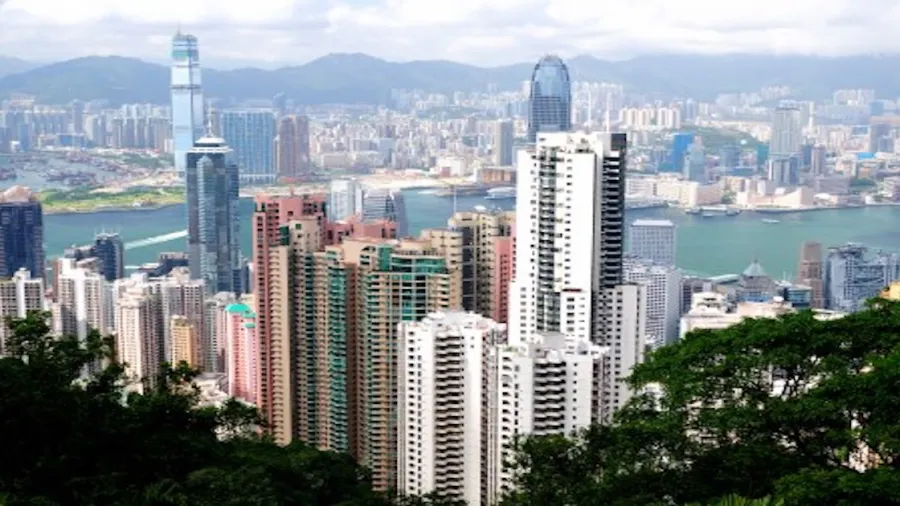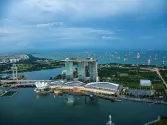
HK property market ‘on the cusp of full recovery’ in 2022
Thanks to the strengthened demand in the retail and industrial property sectors, analysts say.
Property analysts all have the same general outlook—the Hong Kong property market will see recovery in 2022, following the sustained economic growth in 2021; and despite the threats of the Omicron variant.
CBRE Executive Director Marcos Chan said that the higher chance of partial resumption of cross-border travel with Mainland China would boost the retail and business activities in the city, whilst business spending will remain “largely prudent despite increasing levels of corporate activity.
“The positive business outlook will see leasing demand strengthen in the retail and industrial property sectors and result in moderate rental and capital value growth, but the office sector is bounded by the upcoming supply boom, with rents poised to only stabilize in 2022 after a sharp decline from 2019 to 2021,” Chan said.
JLL, meanwhile, said that the residential and industrial centres have overcome capital value corrections in 2020. It added that the whole property market of Hong Kong is “on the cusp of full recovery in 2022,” but at a moderate level.
Office rents enter recovery
The office market of Hong Kong has entered the last phase of the “current down cycle and is on the cusp of recovery in the near future,” Alex Barnes, head of Agency Leasing at JLL Hong Kong said, adding that overall it is expected to rise 0% to 5% next year.
Gross leasing volume is seen to improve next year, supported by the resumption of travel with mainland China, he said, but “the vacancy rate will edge higher as there will be a considerable amount of new office supply slated for completion in 2022.”
In the first 11 months of 2021, net absorption in the overall Grade A office market of Hong Kong was at -643,400 square feet (sq. ft.) but there was more expansion in the recent month and some tenants retract surrendering of their office which shows improving sentiment, JLL said. The overall vacancy rate was at 9.6% by end-November from the peak of 9.8% in September.
Amongst the submarkets, JLL expected rent in Central is the strongest, rising by 5% to 10%, following a 1.2% rebound after a 3.2% dip in the first half of the year. Rent in the Tsimshatsui submarket is also seen to increase up to 5% in 2022, whilst Wanchai/Causeway Bay, Hong Kong East, and Kowloon East were seen to decline by around 5%.
Wendy Lau, executive director and head of Hong Kong Office Services at Knight Frank, said in a report that they also expect Grade-A office rents to increase 5% to 10%, especially in Central, Admiralty, and Wan Chai districts. Lau also said that there will be a new supply of over 2.8 million sq. ft. of office space in the next two years, most of which will be in Central and Quarry Bay.
Knight Frank also said that whilst the pandemic and work-from-home arrangements will affect the office rents, its global (Y)our Space Report showed that around 70% of Hong Kong enterprises plan to increase their office footprint in the next three years.
Cushman and Wakefield Executive Director and Head of Office Services Hong Kong Keith Hemshall said that overall availability of Grade A office space is expected to increase to 16% to 17% by year-end and average rents to drop by 1% to 3%, with the completion of over 2 million sq. ft. of office space Two Taikoo Place in Hong Kong East, 98 How Ming Street in Kowloon East, and Airside atop Kai Tak MTR Station.
“That said, we expect that anticipated border reopening will drive an improvement in the economy and the demand for office space will increase with an estimated net take-up of 300,000 – 500,000 (net floor area) for 2022. We expect banking & finance, insurance and business centre/co-working to continue to be active,” he said.
Alan Yau, partner and head of Real Estate Hong Kong at KPMG China, said leasing demands will continue to improve for Hong Kong next year. Despite the continuing adoption of a hybrid model of work set up in some companies, Yau said that small and medium-sized organisations are still relying on physical setup.
For the office sector, leasing momentum is expected to improve if cross-border travel with Mainland China partially resumes, despite the uncertainties posed by the spread of Omicron, said Ada Fung, executive director, head of Advisory & Transaction Services–Office Services at CBRE. Grade A office rents are expected to remain “largely stable” through the year.
Overall rents in Hong Kong will remain flat, following a decline of 7.3% in 2021. Greater Central and Kowloon East were the only submarkets expected to see an up to 5% increase in rental change, whilst Wanchai, Causeway Bay, Hong Kong East, and Tsim Sha Tsui were seen to decline up to 5%.
‘Fairly resilient’ industrial sector
Samuel Lai, senior director for Advisory & Transaction Services–Industrial & Logistics at CBRE, said there were more expansion requirements in the industrial sector in 2021 compared to the previous year, driven by third-party logistics (3PL) operators that accounted for over 50% of the leasing activity.
“With a possible demand recovery from retail-related trades, leasing demand from 3PLs is expected to pick up. We also see a sustained and growing leasing demand from the tech and healthcare sectors,” Lai said, adding that industrial property is set to be the best performing commercial sector with limited space available for rental growth this year.
The warehouse sector rents rose 3.9% in 2021 and were expected to increase by 5% to 10% this year. Flatted factories and industrial or office sector rents rose by 1.3% and 0.2%, respectively, last year. New supply for the warehouse sector is seen to reach about 1.4 million sq. ft. in 2022, compared to 90,000 sq. ft. in the previous year.
Yau also noted that industrial property and logistic warehouses “continue to be fairly resilient” because of e-commerce.
“I think high-end warehouse space in Hong Kong is fairly limited,” he said. “The quality, convenient locations for logistic warehouses [are] highly sought after. That also implies the rent for these logistic warehouse spaces will be going up.”
He also noted that in recent months, old logistic warehouses are being converted into data centres and cold chain storage space, noting that data centres would be a “very hot property” in the next few years.
JLL noted that total investment volumes in Hong Kong rose 52% YoY to $96.8b in 2021, with investors reallocating their capital to “income-resilient assets or properties that have the potential to be repurposed.
This boosted investment volume into industrial properties by 217% YoY to $33.6b, accounting for 35% of total investment volumes and the highest across all property sectors.
Improving rents for retail
Vacancy rates of High Street shops and Prime shopping centres are expected to improve next year, forecast to rise 5% to 10% and 0% to 5%, respectively, according to JLL. This is following a decline in preliminary rent value for High Street shops in 2021 at 6.9%, and 2.1% for Prime Shopping Centres.
“We believe the overall rental correction has reached the cyclical bottom, though some adjustments will likely continue in some areas of major shopping districts to accommodate the structural change of the market,” Jeannette Chan, Senior Director of Retail at JLL in Hong Kong, said.
JLL noted that the improved leasing sentiment in Hong Kong has led retailers to commit to longer lease terms and more brick-and-mortar shops at affordable rents.
Whilst luxury brands had been the “most aggressive tenants over the decade, there has been a structural change in the retail dynamics in the market switching to mid-to-mass market retailing from luxury, it said. JLL added that luxury fashion and accessories brands are reducing their flagship stores and some are looking at opportunities through pop-up stores.
Cushman & Wakefield’s Executive Director, Head of Retail Services Hong Kong Kevin Lam said the consumer market is expected to improve further in 2022 following the gradual recovery of the domestic economy and employment rate, with vacancy seen declining. He added that overall high-street rents will “likely recover” more in the first half of the year between 2% to 5%, with the Central district recovering by 5% to 8%.
The reopening of borders will also support major brands’ expansion plans, he said. “However, a net population outflow is expected at the initial stage of the border reopening, bringing short-term pressure on retail sales, and particularly impacting food and beverage (F&B) businesses during weekends. Accordingly, the return of tourists and their related consumption activities will drive recovery in the longer term. The wellness and athleisure trends we saw driven by the pandemic are expected to continue in 2022.”
CBRE also expected retail rents to increase by about 5% if there will be no major outbreaks that will lead to tightening of social distancing which could pull back leasing demand, according to Lawrence Wan, senior director for Advisory & Transaction Services–Retail. He added that F&B, particularly Japanese cuisine, is still the most active sector in the leasing market last year.
“Mass market brands and necessity item retailers have been relatively more positive. Improved market sentiment has seen some landlords holding a firmer stance in terms of rental asking. Therefore, vacancy might stay high as the expectation gap between landlords and tenants widens,” he said.
New supply in prime shopping malls was expected to reach 1 million sq. ft. in 2022 from 184,200 sq. ft. in 2021, it said.
KPMG’s Yau said that the retail market is “fluid at the moment,” with malls in prime locations filled compared to 12 to 18 months ago. However, for the luxury retail sector space, there is still significant pressure to try to downsize operations unless international travel restrictions are lifted.
“The projections of the restriction from international travelling and the uncertainty arising from when the border will be open creates a lot of unfavourable factors for these retailers to continue to expand their footprint especially in a very expensive retail environment in Hong Kong,” he said.
For Knight Frank’s Helen Mak, senior director and head of retail services, rents for the retail market are seen to stabilise in 2022, adding that it expects experiential retail to become the “next biggest trend” as retailers can not rely on products alone to steer sales.
Rise in residential rents, price
With the economic recovery, preliminary data showed that capital values of mass residential rose by 4.4% in 2021, whilst luxury residential increased by 7.2%. The luxury residential rents also increased by 3.2% during the period due to upgrading because of the work-from-home arrangement.
JLL said residential sale transactions rose about 28% at a monthly average of 6,374 deals from January to October, from the monthly average of 4,990 deals in the previous year. “If the trend continues, the average monthly transaction volume will reach the highest since 2013.” JLL Hong Kong Chairman Joseph Tsang said that for 2022 mortgage rates are expected to remain low despite the possible rise of interest rate.
"New private housing supply will remain low in the medium term, with private residential units that have commenced construction dropping noticeably since 2020 after the government changed the public to private housing supply ratio to 70:30 in 2018. It will support the capital values of mass residential to stay firm and grow 0% to 5% next year, whilst luxury residential prices and rents will also climb 0% to 5%," he said.
For Knight Frank, the residential market in Hong Kong is expected to grow 3% in prices in 2022, following the recorded largest increase in 2021 since 2019. Martin Wong, director and head of Research and Consultancy in Greater China also said that the anticipated opening of the border to mainland China will also allow room to boost the luxury housing prices, increasing by 3% to 5% next year.
“Hong Kong will continue to maintain a low-interest rate environment in the next 12 months, encouraging more buyers to enter the market, with some second-hand purchasers moving into the primary market,” Wong said.
Knight Frank expected mass residential prices to increase 0% to 3% and rents to climb 2% to 3%, whilst luxury residential prices will increase 3% to 5% and rent by 2% to 3%. Wong also said that total transactions volume in 2022 may fall back to 60,000 to 65,000, with the primary market making up 30% of which.
JLL’s Tsang also said that with the Northern Metropolis development plan, there is a need to develop an additional gross residential floor area of 400 million sq. ft. to meet the government’s vision of housing 1.54 million people.
Cushman & Wakefield Director in Hong Kong Keith Chan said they expect the residential market to continue to prosper in 2022, following an active market in 2021, reaching nine-year high transaction volumes. They expect around 18,500 private units available.
“The high base number of 2021, combined with a shrinking stock of small-value units, will likely diminish the 2022 transaction volume by around 10% YoY. However, an improved economic environment will likely drive a further rise in home prices. We anticipate home prices to climb by around 5% to 10% next year. Luxury homes in urban areas will likely benefit more,” he said.
KPMG’s Yau also said that Hong Kong remains to be one of the most expensive residential markets globally. There is still demand in New Territories where presale is very active.
Investments
Antonio Wu, Knight Frank’s head of Capital Markets, Greater China, said that the overall investment climate “picked up” in 2021 with a total of 136 deals made, compared to 97 in 2020, adding that en bloc industrial and retail properties accounted for the biggest percentage of the $70b transactions. Hotel property also saw strong sales activity in the second half of the year, he said.
“Moving forward to 2022, we believe there will be growing investment interest in funds/private equity funds, residential, data centres and hotels. We foresee Chinese mainland developers selling properties due to their financing positions, which will increase supply in the market,” he said.
Meanwhile, Oscar Chan, JLL Hong Kong’s head of Capital Market stated that they expect hotel assets to remain as the focus of investors in 2022 and aged assets for compulsory sales. Sales of hotels, particularly mid-low end hotels with easy access to MTR station were active in 2021, with investment considerations for en bloc hotels skyrocketing by 198% YoY in 2021 as investors mull converting them into rental housing, according to JLL.
Chan said the sales momentum of industrial properties will be moderate “as the capital values have been lifted considerably by strong capital inflows this year.” Its capital values for 2022 are expected to increase from 0% to 5%. Grade A offices capital values, meanwhile, are also seen to rise 0% to 5%, whilst High Street shops will rise 5-10% in 2022 due to rental recovery.
Cushman & Wakefield’s Head of Capital Markets Hong Kong Tom Ko said that total major transactions volume in 2022 to surpass 2021 levels and reach 200 deals worth $100b, with industrial buildings, residential development sites and multi-family conversions to be the “three key pillars” of the investment market in 2022.
He also said that the demand for industrial buildings, which reached a historic high last year will continue in 2021. He noted that investors worldwide were attracted to multi-family conversions, such as serviced apartments and hotel properties, which were expected to benefit from the revival of tourism, adding that the proposed lower threshold for compulsory sales will “trigger to more development site transactions in 2022.
Challenges
There were a number of international funds that have completed new rounds of fundraising of their investment cycle in the next few years, following a muted activity of over a year. Property firms, however, will be competing in securing limited stock of assets in the city, Cushman & Wakefield’s Chan said.
“The challenges, therefore, come from the ability to make competitive offers, and timely decisions,” he said. “It is advised that property firms should form a clear investment objective and target beforehand, and structure deals in their most comfortable way, with the right balance of equity and debt.”
Yau, meanwhile, said that liquidity is of “paramount importance” for property firms. He said that they should make sure to have enough liquidity to service various demands like capital expenditure, interest, and loan repayment burden. Creating flexibility in leases is also a key in managing assets for landlords, he said.
“I think developers will try to use different strategies to offload these inventories. For instance, they allow buyers to lease for the first maybe two to three years before the actual property is handed over. So these create a lot of flexible arrangements to buy or to commit to acquiring properties from developers. And that sort of flexibility will continue in the next year,” Yau said.
Maintained positive outlook
The coronavirus situation may also come into play and remain to be among the key risks for 2022 for the sector, he said.
Despite the threats of the spread of the highly transmissible Omicron variant, property analysts maintained their projection of improving rents across the property sectors.
Martin Wong, director and head of research and consultancy for Greater China at Knight Frank said the spread of Omicron would lead to a reduction in residential transaction volume in the short term due to reduced viewing/inspection activities and slowed down launch of new sales project, but the impact on price will be limited as seen in previous increase in cases.
However, there would be a more significant impact for office and retail leasing as some companies may delay their new leasing or expansion and tightened social distancing measures may lead to lower retail sales prospects. But the impact on office and retail rents would be limited, Wong said, as a reduction in rent “would not help those businesses to take up space if they have concern on their business prospects.”
“Based on the above reasons and given Omicron is not widely impacting the Hong Kong community as in the other cities, we maintain our previous forecasts,” he said.
Nelson Wong, head of research at JLL in Greater China, also said that they maintain their projections, but noted that the property market in general “will likely bump along the bottom longer instead of edging up,” depending on the longevity of the fifth wave.
He said that the retail sector may be hit harder because of the “disproportionate disruptions” it may face, whilst the residential sector will be less active due to stricter distancing measures affecting developers' sales campaigns. The office sector, meanwhile, would be the least effective, Wong said, noting that the positive momentum especially in the Central “will likely continue unless this fifth wave is considerably prolonged.
Cushman & Wakefield’s Chan also believes that “the directions remain largely unchanged” but the Omicron breakout would prolong the recovery process.



















 Advertise
Advertise






